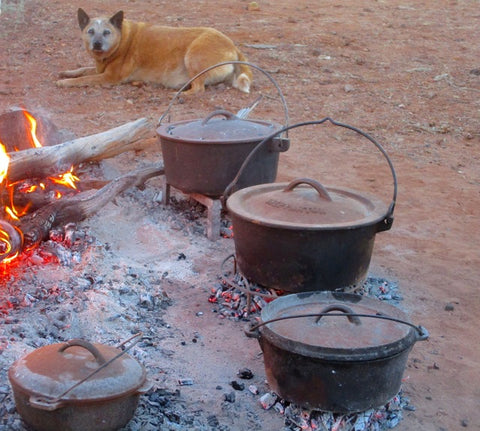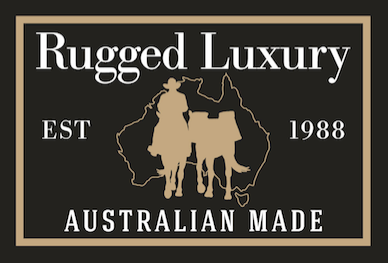To many people life in the bush has a romantic side where the mind conjoures up perfect shady camp sites under blue sunny skies with plenty of happy friends sitting around eating campfire cooked meals and drinking lots of cold beer.
The reality however when living in the bush on a permanent basis and working each day regardless of the weather conditions can be somewhat different. Having plenty of food in freezers and a supply chain for refills organised, sufficient capacity for holding water and other essentials in case the next town trip is delayed by rain throws up a few challengers the average weekend camper doesn’t generally come across. Most of the problems can be overcome with planing and if you have good food and plenty of it then the camp generally remains happy and content.

Quality camp cooked food is most important so every effort is made to keep a good variety of healthy meals coming forward on a regular basis throughout the week and leaving the light weight snack meals for the weekends.
In this camp the camp ovens rarely have time to cool and luckily we are surrounded by excellent burning wood for coals and select the snakewood and mulga leaving the oak and gum for others not so well informed. Having a good sized loader in camp makes collecting wood an easy task after the days work has finished and a few beers helps as well as we disappear into the bush on quad bikes to where old mulga stumps cut down many years ago by axe for fencing and shoring up mine shafts can be pushed out and loaded. A couple of loads gives us enough wood for a week unless some late nights occur when the odd visitor turns up and the fire is over stoked.

Everyone plays their part in food preparation cooking and cleaning up although our good friend Kiwi Steve is by far the most creative and regular cook in the camp and always keen to dig out a new recipe to try from the CWA cooking handbook.
Some of the regular meals being roasts of pork, beef or lamb, grilled steaks on the hot plate, potato and tuna bakes, roast lamb shanks with roast spuds, carrots and pumpkin, beef or lamb stews, corned beef, picked pork, lamb chops and even some snags from time to time. In addition to that are home made sausage rolls, bread rolls, apple turnovers, date loaf, and brownies. As the birthdays occur Steve makes the effort and turns out a triple choc cake with loads of cream, a combination of ingredients that helps keep our sugar levels in order.

Camp oven cooking becomes an individual choice of the many ways to apply heat and end up with a cooked meal. Some like to use a stand so there is air space between the coals and the oven, others plonk the oven straight on top and insist that is the best way. Then some apply coals on the lid from the outset, some half way through and others never put coals on top, so many choices with the end result being the same, a cooked meal. For damper and bread the old method was to dig a hole, lace it with coals, place the oven inside and put more coals on top the cover with soil. I haven’t seen that done since the stock camps in the NT back in the late 60’s, but it worked.
There is no doubt the evenings about the fire having a beer and smelling a roast cooking is hard to beat. The down side to this wonderful life style is the cost of living as anything purchased locally has a freight component added, fuel for example no matter which type is purchased all costs $170/ L. Meat prices are staggeringly high and we often talk about getting roo to offset and reduce our overall meat costs. They do sell roo tails in town but they range from $18- $26 each so killing and dressing our own is the better option. Camel is also worth considering but the quantity to store without wastage becomes a problem so I continue to buy in town at the best price available and the boys have the majority of their bulk meat delivered from Perth at a fare better price.
The local price for fruit and veg is up there as well and raises a few eyebrows of the visiting prospectors on shopping days. Town visits for supplies are controlled as to when the delivery truck arrives, I tried shopping on a Tuesday and found the shelves and freezers almost empty and not one loaf of bread in town so Fridays is safe as the truck generally arrives Thursday and the shelves re stocked by about 11am the following day.

The bush tracks into town could be rated as poor to bloody wicked and from our direction south east of Laverton the bitumen starts in the back streets of town. The standard 5k’s or graded road on the edge of town is good but from there on it’s a nightmare. Open creek crossings are down to 1st or 2nd gear and there are over 40 between our camp and town. The last 10k’s is a station bush track via old broken down bores and if rain falls then all trips are cancelled until the track dries out.
The few downsides to life out here are accepted as part of the deal, living and making a dollar out in the mulga is a wonderful lifestyle which I wouldn’t swap readily and I won’t mention the heat, dust and flies or the freezing desert nights.
Until next time.
Steve and Sass
